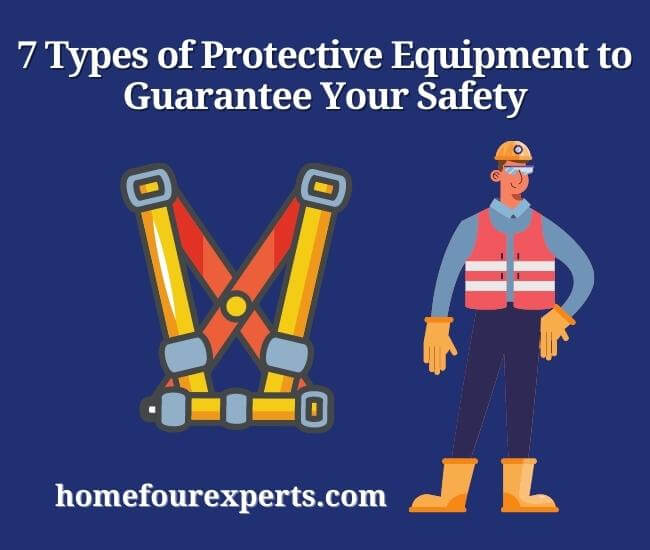You know how the famous saying goes; it’s better to be safe than sorry. In this segment, that is the motto we’ll be working with.

In any scenario whatsoever, there are certain threats and risks that can potentially harm you. Even if the damage is minuscule, it’s still your duty to ensure that you’re never in harm’s way. To help you get there, there is a plethora of personal protective equipment that ensures optimal safety for the individual.
If you’re in an active workplace, there are seven types of personal protective equipment that will make your experience safe and wholesome!
1. Earplugs
The first thing on this list is arguably one of the most important. If you’re working in a factory or anywhere that produces a decent amount of noise, earplugs are, without a doubt, an asset.
There have been studies that cite how individuals who are around loud noises too often can have a deterioration of hearing quality down the road. With earplugs, you’re stopping that from happening.
2. Welding Goggles/Shield
After the earplugs, we move to the eye. In an auto repair shop or any similar surroundings, there is a lot of welding work done. The major downside of welding is that it produces a lot of sparks. Hot to the touch, these sparks can be quite dangerous if they land on something sensitive.
Since you’ll have to work in close proximity, it’s of utmost importance that you protect your eyes. For that, welding goggles are the best equipment to keep close by.
3. Helmet
The importance of a protective helmet is severely underrated. Manufactured from strong and sturdy material, the helmet provides immediate protection for our head from any blunt force.
However, there are other reasons as well why you should consider wearing them. For example, the place you work in is susceptible to dust or wood shavings; it’s fair to say that you wouldn’t want any of that getting in your hair. A good helmet will prevent that from happening.
4. Gloves
Gloves are recommended for virtually anyone who works in a workshop or an auto shop. Hands and fingers are the bread and butter of any individual who works manually. Hence, it’s your duty to ensure that they’re kept protected at all times and out of the way of danger.
There are many cases where we highly recommend that you keep your gloves on, such as finishing work, wood-cutting, or similar high-risk activity. Furthermore, gloves will also keep your hands warm in colder weather and make it easier for you to warm up before starting with your day.
5. Joint Protection
One thing that really stands out about jobs that require individuals to get their hands on stuff is that you don’t have to shy away from virtually any type of task. To get these tasks done, the individual will get on their knees if the job is required at a lower level, or literally lay on the floor if they have to fix the engine underneath a car.
In these cases, you need something which will protect your joints, such as the knees and the elbows, to prevent any bruises or calluses. Knee pads for flooring are the easiest way to start and should be in the arsenal of any beginner. If you feel the need down the road, you can also consider getting pads for your elbow.
6. Dust Mask
Coal miners and individuals who work in similar environments are very susceptible to developing diseases and deficiencies related to the respiratory system, even after a small type of exposure. Not to imply that working in an auto shop is anything similar, but it’s still not worth the risk to not take any preventative measures.
A dust mask will serve as your first line of defense against any pollutant and allergen entering your nose. If you work at a place that is susceptible to dust and another type of debris, this is highly recommended for your personal safety and well-being.
Additionally, a dust mask also encourages a healthy working environment and is something you’ll thank yourself for down the road.
7. Safety Shoes
Safety shoes, as opposed to traditional shoes, can make all the difference there is to enhance your overall work experience. Ditch the chuck Taylors and the vans, and make space for genuine boots that can keep your feet sealed and protected.
The recommended shoes that can provide your foot with comfort whilst ensuring maximal protection are tough and sturdy boots. Made from a wooden exterior or leather, these safety shoes are made to last and can hold their own against harsh environmental and external factors.
Specific Guidelines for Maintaining and Replacing Protective Equipment
Yes, there are specific guidelines for maintaining and replacing protective equipment. The guidelines vary depending on the type of protective equipment and the industry or application, but some general principles include:
- Regular inspection: Protective equipment should be regularly inspected for signs of damage, wear, or degradation.
- Proper storage: Protective equipment should be stored in a dry, clean and cool environment to prevent damage.
- Manufacturer’s guidelines: The manufacturer’s guidelines should be followed for maintenance and replacement, including any recommended inspection or replacement schedules.
- Replace after impact: Protective equipment that has been subject to impact, such as a hard hat, should be replaced, even if it appears to be undamaged.
- Expiration dates: Some protective equipment, such as respirators, may have expiration dates and should be replaced accordingly.
- Industry standards: Industry standards, such as OSHA (Occupational Safety and Health Administration) in the U.S., should be followed to ensure that the appropriate level of protection is maintained.
It is important to regularly maintain and replace protective equipment to ensure that it continues to provide the intended level of protection.
Likewise, they’ll also keep your feet warm, which is a major plus!
You Might Also Like:
- Choosing Best Tile Saws for the Money
- What are the Best Jigsaws, Click Here
- Our Top Ten Best Torches for Dabs – Reviews
- What is the Best Plastic Welder
About This Writer

Hi, I am Eric Devin and I am a professional interior architect. Since childhood, I've always enjoyed DIY projects! And, I have loved to solve simple household problems using essential tools and equipment. I have also acquired a lot of information about basic household tools settings by working with contractors.